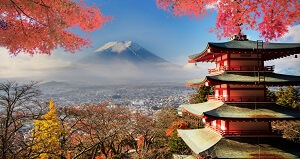How Much Does it Cost to Move to Japan?
Last Updated on December 27, 2023
Written by CPA Alec Pow | Content Reviewed by ![]() CFA Alexander Popinker
CFA Alexander Popinker
Japan is one of the world’s strongest economies, but also one of the countries with the highest life expectancy, along with Singapore, Spain, Sweden, and Portugal. Therefore, the temptation to work in the “land of the future”, Japan being mainly focused on innovative technologies and export, is also great for American citizens, who are leaving their homeland in increasing numbers in recent years. Here’s what you need to know before trying Japanese life.
What do you need to know if you want to try the Japanese life?
Japan, also known as the “Land of the Rising Sun” is, according to legends, a land created by the gods, who stuck a sword into the ocean, and when they pulled it out, the four main islands were born, along with the more than 6,800 small islands, of which approximately 430 are uninhabited.
Leaving the legends aside, we must mention that Japan is a country recognized for the well-being of its citizens, and Tokyo, its capital is among the richest cities in Japan, but also in the entire world. The highest salaries in the country are also earned here, with the average net salary being around 325,000 yen per month, i.e. $2,700 per month.
How Much Does it Cost to Move to Japan?
The monthly cost of living in Japan is not always cheap, especially in cities with many immigrants, such as Tokyo, Kyoto, or Osaka. Rent for a one-bedroom apartment in central Tokyo averages around 130,430 yen ($930) per month, which also requires a salary to match. If you are willing to live outside the big cities, in the beautiful suburbs and rural areas of Japan, the rent will be much more affordable, and you will fall in love with the quiet life outside the big business centers.
If you are renting in Japan, you will most likely have to pay a broker’s fee, even if you find your new home online. It’s quite unusual for apartment owners or companies to rent their properties directly, so starting by using an agent will save you time and help you find the place that suits your needs.
You should know that the actual living space in Japan is much smaller than your average studio in the USA. You will have 899 people living per square mile.
Here are the average costs for renting an apartment in Japan its size and the period of time needed to follow the procedures.
| Type | Time | Monthly Rent Cost |
| 1-bedroom | 8 to 11 weeks | $3,500 to $4,900 |
| 2-bedroom | 5 to 8 weeks | $4,800 to $6,400 |
| 3-bedroom | 5 to 8 weeks | $8,300 to $11,100 |
| 4-bedroom | 5 to 8 weeks | $8,800 to $11,900 |
Also, you should know that the apartments are named differently from the USA. For instance, they are named 1DLK, 2DLK, and so on, and the letters represent the space while the numbers refer to the number of bedrooms. The spaces are Kitchens, Living, and Dining.
Methods of transporting goods to Japan
If you need to transport your household goods from the USA to Japan, you have only two options: air and sea freight. You will have to choose between one of these depending on your timeline, the number of items you have, and your moving budget.
Sea freight
The most common method of transporting goods is through container shipment. When choosing this method, you will have two options:
- Less-Than-Container-Load (LCL), which is a shared cargo load and you will have to pay only for the volume of your goods taken on a shared container;
- Full-Container-Load (FCL), which gives you the option to choose between 40 ft and 20 ft containers.
Airfreight
As you would expect, your goods will be moved by plane. The cost will depend on the distance and you will be charged per kilogram, so it will be much more expensive, in some cases up to four hundred times more expensive. Though airfreight is ideal for transporting family heirlooms, fragile items, and other goods you need to be shipped expedited.
Tips for preparing for a move to Japan
It is recommended that expats start planning their move to Japan at least eight months in advance. Also, they should have enough financial resources to ensure their living for eight months to one year.
You might also like our articles about the cost of moving to the UK, travel to Tokio, or move out of state.
Customs duty
It is more accessible than expected to move your household goods to Japan. If you have had your goods for more than six months before your move, you don’t have to pay customs. A duty exemption is applied for items that have a total customs value of 10,000 yen or less (around $72). Also, you will have to take into consideration other customs rates and taxes. Though, these will be highly influenced by the port of entry.
In order to avoid confusion when translating, it is recommended to have every item listed in both English and Japanese when you write down your customs inventory.
Taxes
There are three categories of taxes: consumption, property, and income. These taxes are paid at the municipal, prefectural, and national levels. You must contact an accountant in order to make sure you are not double-taxed if you live abroad. Depending on how much you earn, you may not have to pay taxes in the USA.
Similar to the USA, in Japan taxes are based on taxable income brackets:
- 9,000,000 yen ($64,335), the tax rate is 23%;
- 6,959,000 yen ($49,812), the tax rate is 20%;
- 3,300,000 yen ($23,590), the tax rate is 10%;
- 1,950,000 yen ($13,940), the tax rate is 5%.
Visas
 You will need to wait a minimum of five working days to get a visa acceptance in Japan. Depending on the Embassy or Consulate handling the paperwork and the purpose of your visit, it may take less time.
You will need to wait a minimum of five working days to get a visa acceptance in Japan. Depending on the Embassy or Consulate handling the paperwork and the purpose of your visit, it may take less time.
The process of applying for a Japan visa is relatively hassle-free and easy. Though, there are around thirty types of visas in Japan. You should consult with a specialist to learn which one applies to you as each of them has its own specific requirements.
Here are some of the most common visas you need to know about if you want to move to Japan:
- Start-up visa: for entrepreneurs supported by municipalities in Japan;
- General visa: for cultural activities, students, dependents, and training;
- High-skilled professional visa: high-skilled human resources per their Point System;
- Specified visa: for spouses of permanent residents, designated activities, and long-term residents;
- Working visa: for business managers, professors, medical services, artists, journalists, and more.
Getting money
In Japan, you can open a bank account only in person. Even if you are not able to speak Japanese yet, there will be an English translator at most banks to help you. Also, in Japan, you will find most banks that you can also find in the USA, so you can use the same bank account.
It’s a good idea to check if your bank has a partnership with another Japanese bank – or even if it has a branch in the area where you’ll be in Japan. Many international banks are also present in Japan as it is a world financial leader.
Final words
As for other countries, the following basic conditions remain valid for emigration to Japan:
- to know English, Japanese being a huge advantage;
- find out about the additional documents you need;
- to find out about prices, benefits available to you, details about the diaspora, etc.;
- to know the traditions and legislation of the state.


Leave a Reply
Want to join the discussion?Feel free to contribute!